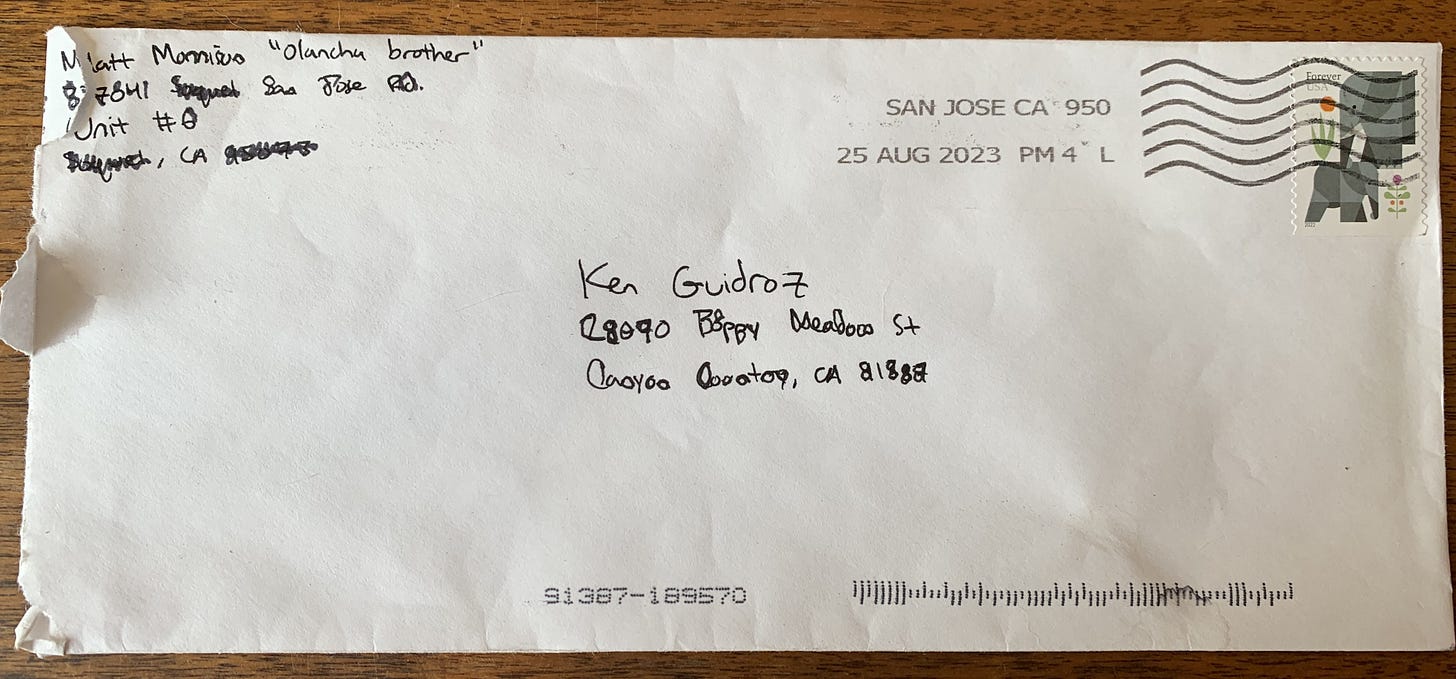Faith and Reason—How do you balance the two?
A letter from a young man I met in the mountains last year.
This letter is from Matt. We met when I was camping at the end of a long dirt road at the base of the towering Olancha Peak in the Sierra. He had recently graduated from UC Berkeley. I didn’t expect to see anyone at this remote spot, but there he was, lying in a minivan, barefoot, legs up as he read a book. He walked out to meet me with Dostoevsky’s The Brothers Karamazov in his hand. I thought, Ahh, I think I’m gonna like this kid.
He told me he’d just hiked the 12,000-foot Olancha Peak, one of the 15 Sierra Club Emblem Peaks he planned on hiking that summer. Ahh, now I really think I’m gonna like this kid. (He bagged 14 of them that summer and got the 15th last month.)
I told him I was writing a book about letters to my son who was in prison—and he showed genuine interest. He asked about our relationship and my past and my faith and my having served in the ministry. Within minutes he was telling me about Dostoevsky and his disaffection with the Russian church, and how he feared the rising secularism, and how people were losing a personal connection with God. Yup, I like this kid.
This could have been just another chance encounter—like I’ve had 25 times while writing my memoir—but this one felt different; this young man had something special; he had a light in his eyes you don’t see every day. So I asked him for his email address and he gave me a .edu address. Doggonit, he’s blowing me off.
But he wasn’t. We emailed a couple times and it was good. Then this letter showed up last month, actually handwritten.
Dear Ken,
(He caught me up on his adventures over the last 18 months since we’d met…and then this…)
What is the relationship between faith and reason in Christianity? I’ve thought about this a lot lately and I’d love to know your thoughts on it. I’ve studied Kierkegaard and Dostoevsky, who emphasized passion and faith, and deemphasized reason. I’ve studied Hume, who was the opposite and espoused pure reason. And I’ve recently read Gary Habermas’s dissertation on the importance of being intellectually honest and empirically rigorous with respect to the resurrection and other events central to the Christian faith.
When you and I met on that trailhead, we talked about your faith and some of the changes you had been through. Were you struggling with this same thing…the interplay between faith and reason? And as far as church, you said that you had left yours. How is that for you now? Is church still a part of your life?
I’m thinking about these things a lot. I have faith, to a degree. But I also put a lot of stock in science and I need things to be rational. I want to make my own leap of faith but it seems like reason and rationality will help me make that leap more doable.
Dear Matt,
You ask a great question. And, in a nutshell, both faith and reason are equally important. I, personally, couldn’t have one without the other. I just couldn’t. If I just shut my mind to reason, my faith would be hamstrung, like I was just thinking wishfully. My faith would become just a fairytale; me fooling myself into belief.
The Bible puts it this way: love God with your heart and mind. To me, faith is the ‘heart’ of loving God. And reason is the ‘mind’.
Compare it to the relationship you have with your girlfriend. The ‘heart’ part is all the emotion you feel, you know, the attraction, the intrigue, the excitement, the warmth, the security, and the acceptance you feel from her. It’s the gooey stuff, the feel-good stuff. This is what usually comes first, but it’s only part of the equation. Now you need to see if you can get the ‘mind’ part down.
You need to see if she stimulates your thinking, if she sees life like you do, if she sees family like you do, if she can tolerate your idiosyncrasies—and if you can tolerate hers. Can she handle you taking a month off to roam the earth every year? Can she live with your moods and your mistakes? Is she gracious? Is she someone you want to have lunch with? (Remember Joyce and the book?) And do the two of you view God the same way?
If many of these “mind” questions are ‘no’, then you’ve got to really think about your relationship. Is it one that can go deep? Will it last?
So, too, with God. It takes both heart and mind; it takes both faith and reason.
And reason can be satisfied in many ways. It might include the piece by Gary Habermas that you mentioned before. It might include learning how reliable the Bible is as an ancient document from Josh McDowell’s book, Evidence that Demands a Verdict. It might include the faith-argument from DNA and the sciences that Francis Collins made in The Language of God. (He is one of the leading scientists of our time.) Or it might include the delicious, lyrical, profound logic of C.S. Lewis in Mere Christianity (and virtually everything else he wrote).
All of these do it for me.
But oddly, after 45 years of being a believer, perfectly content in my belief, a brand-new idea has occupied my mind. It has further convinced the left side of my brain that there is a God. And it is this: we have a soul. We humans have something so unique in this universe, so exquisite, so unlike any other feature of the cosmos, that it seems to cry out like a beacon that there is more to existence than just the physical. It seems to suggest that there is more than just matter and gravity and electricity and energy. There is also the ineffable, the part of us that can chisel a giant block of marble and end up with The David. We are the only being that can dream up a man catching a giant marlin, but then lose it to sharks, as in The Old Man and the Sea. Our soul-selves work on wards with contagious patients, we map out next year and learn from last year. We are self-aware; we are eternity-aware; we are God-aware. Food, water, shelter, and reproduction are not enough for us. Instinct is not what rules us. We. Have. A. Soul.
To me, this uniqueness is a hint, a sign, a pulling back of the curtain, to show us that there is more, something special, maybe something eternal. And when we peek around the curtain, we get a glimpse of the hem of God, a split-second glance, a sighting we’re not sure of. Was that…was it just a shadow…was it…God?
The idea of our universe being the result of a very big bang 14 billion years ago? Very possible.
The idea of plants and animals evolving on our planet over time? Very believable.
The idea that a creature like us, with such creativity and sentience and magnanimity and grace and self-sacrifice and intelligence, just evolved or is here by chance? No way.
What other being plans for tomorrow and mulls yesterday?
What other being forgives? Or has the audacity to ask for it.
What other being runs into a burning building to save someone?
What other being searches for meaning?
What other being conceives of eternity?
What other being admires a sunset?
What other being chooses right or wrong?
None.
Call me a speciest. Okay, that’s fair. But I’m more. I’m an eternalist. I’m a soulist. I’m an image of Godist.
Whew, now I’m breathing hard…Matt, I really got going there...sorry about launching. Anyway, you get my point.
Okay…you also asked about church. Well, I don’t attend where I used to, but I’m still very close to many of those people. Now I’m part of the worldwide family of believers—I’m part of the church that is not defined by a membership list but by faith and camaraderie and prayer. It is still very much a family.
So, my brother, I hope this stimulates your thinking and helps you make that final leap of faith.









